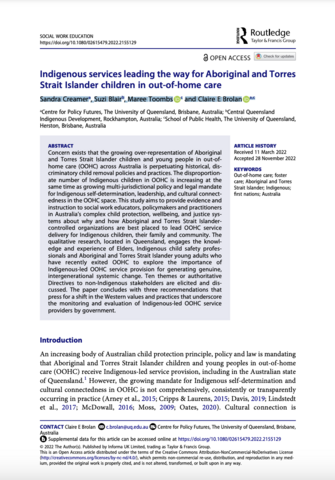Concern exists that the growing over-representation of Aboriginal and Torres Strait Islander children and young people in out-of home care (OOHC) across Australia is perpetuating historical, discriminatory child removal policies and practices. The disproportionate number of Indigenous children in OOHC is increasing at the same time as growing multi-jurisdictional policy and legal mandate for Indigenous self-determination, leadership, and cultural connectedness in the OOHC space.
This study aims to provide evidence and instruction to social work educators, policymakers and practitioners
in Australia’s child protection, wellbeing, and justice systems about why and how Aboriginal and Torres Strait Islander controlled organizations are best placed to lead out-of-home care service delivery for Indigenous children, their family and community.
The qualitative research, located in Queensland, engages the knowledge and experience of Elders, Indigenous child safety professionals and Aboriginal and Torres Strait Islander young adults who have recently exited OOHC to explore the importance of Indigenous-led OOHC service provision for generating genuine, intergenerational systemic change. Ten themes or authoritative Directives to non-Indigenous stakeholders are elicited and discussed.
The paper concludes with three recommendations that press for a shift in the Western values and practices that underscore the monitoring and evaluation of Indigenous-led OOHC service providers by government.

